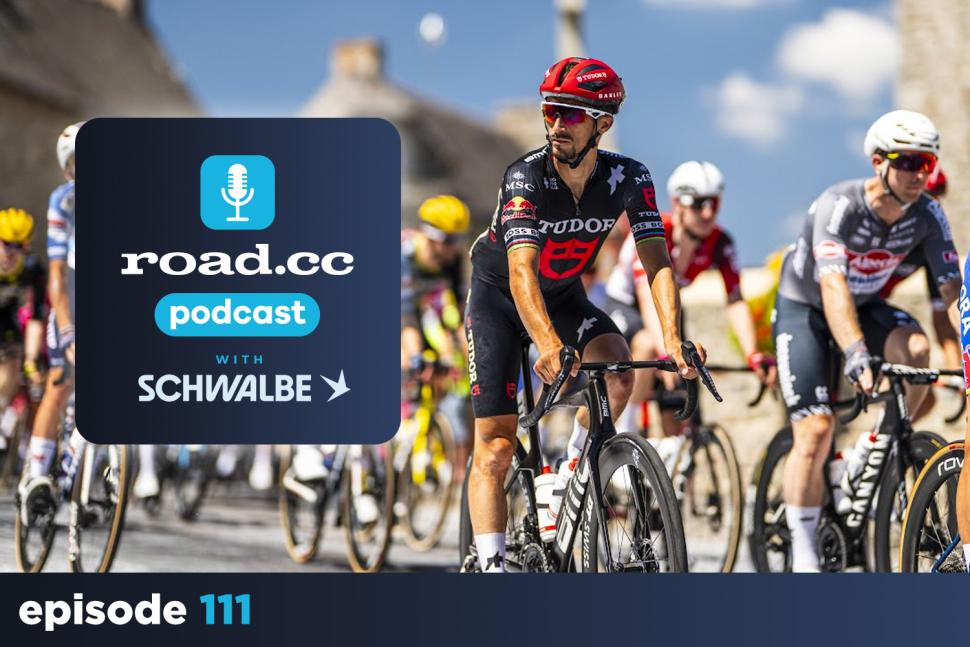“That was a rollercoaster yesterday, eh?” Raphael Meyer sits back in his chair, takes a sip of his espresso, and laughs. “A real rollercoaster. But that’s sport.”
We’re sitting in the rain soaked but rapidly drying courtyard of a hotel on the outskirts of Montpellier, where Tudor Pro Cycling are staying during the Tour de France’s second and final rest day.
The rollercoaster referred to by Meyer, the team’s co-founder and CEO, was installed the previous day on the road to Carcassonne, where the Fabian Cancellara-owned Swiss squad – making its Tour debut this year – were exposed first-hand to the heady range of emotions on offer at cycling’s biggest race.
Listen to the road.cc Podcast on Apple Podcasts
Listen to the road.cc Podcast on Spotify
Listen to the road.cc Podcast on Amazon Music
It all started, like the best theme park attractions do, with a terrifying plunge. In the stage’s opening kilometres, the team’s star rider, Julian Alaphilippe, crashed hard, dislocating his shoulder. After popping it back in, the dogged French hero made his way back to the bunch, made the split, then made the breakaway of the day, where his Tudor teammate Michael Storer was busy attacking.
At the finish, Alaphilippe launched, beating Wout van Aert to the line, where he raised his arms in triumphant, redemptive celebration.
There was just one catch. Over a minute and a half earlier, UAE Team Emirates’ Tim Wellens had reached the finish solo. Even more bizarrely, Victor Campenaerts had finished second, just eight seconds up the road from the double world champion’s group.
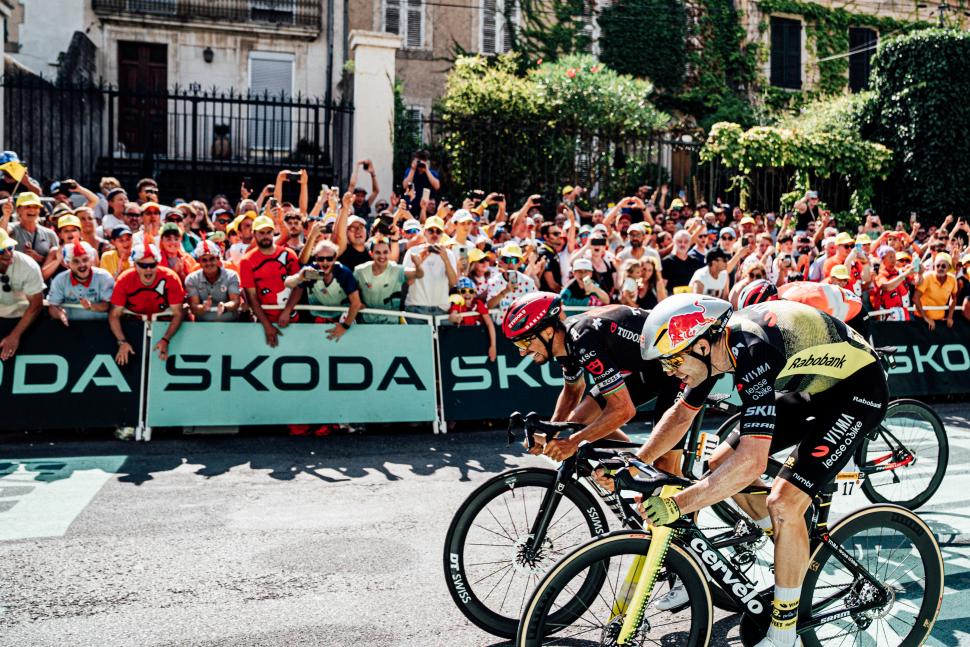 Julian Alaphilippe sprints for third against Wout van Aert in Carcassonne, stage 15, 2025 Tour de France (credit: Zac Williams/SWpix.com)
Julian Alaphilippe sprints for third against Wout van Aert in Carcassonne, stage 15, 2025 Tour de France (credit: Zac Williams/SWpix.com)
In the chaos that followed, a broken radio was blamed, Alaphilippe was whisked off to hospital, and then rushed back to appear on French television, where he insisted he’d be fit to continue (he was).
The next morning, at the team hotel in Montpellier, things are a lot calmer. There’s a gentle buzz of conversation and power washers, as a small group of riders, led by the team’s veteran former European champion Matteo Trentin, stand chatting, relaxed, as they prepare to head out on their rest day ride.
Near the hotel’s rear exit, where the bus and mechanics’ truck are parked, and a small table, backed by a logo-adorned pop-up stand, is decorated with postcards of the riders, a small gaggle of invited guests mill around, chatting to staff and taking photos. Back in the courtyard, the team’s sports directors sit around a long table, tapping away on their laptops.
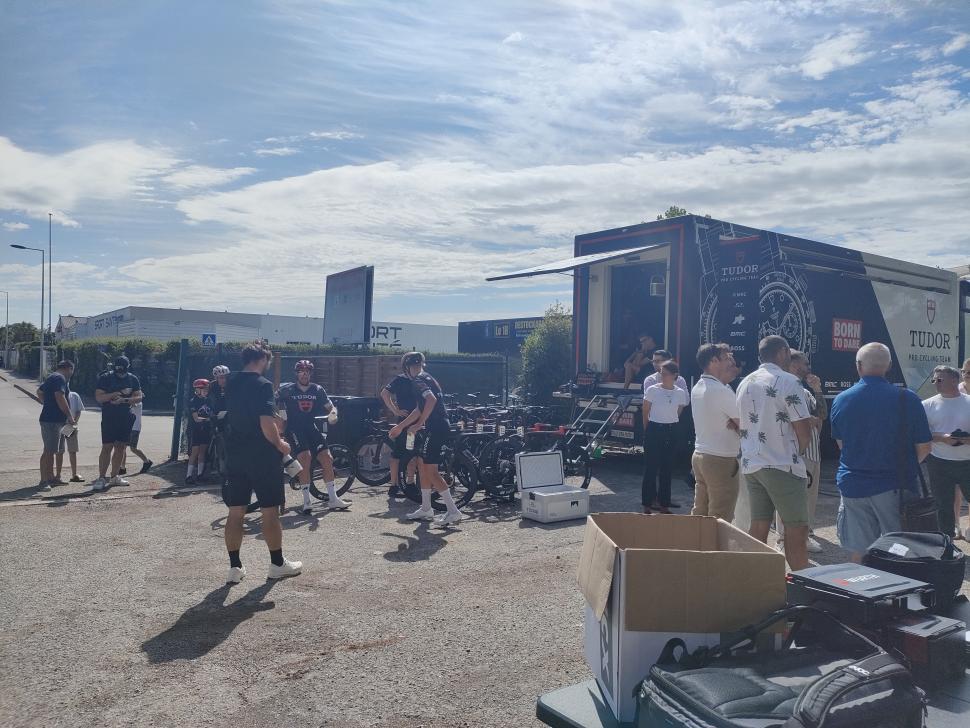 Tudor Pro Cycling rest day hotel, Montpellier, 2025 Tour de France (credit: Ryan Mallon)
Tudor Pro Cycling rest day hotel, Montpellier, 2025 Tour de France (credit: Ryan Mallon)
Australian climber Storer, dressed in his team tracksuit, floats about, relaxed and smiling, before sitting under an awning. He’s not joining his teammates, Meyer informs me. “Michael likes to properly rest on a rest day. He never goes out for a ride.”
After the rest of the riders (minus Storer) have left, Alaphilippe – who wasn’t scheduled to ride today after his crash – appears, in full team kit. He shouts something over to Meyer about checking his shoulder, says nothing to anyone else, grabs his bike, and goes.
Meyer takes another sip of espresso from his Tudor-branded cup. “It’s not the very best coffee. But it’s better than what you’d normally get in France.”
39-years-old, blonde, tall, and skinny, Tudor’s Swiss CEO balances a generally laidback, confident aura with a determined enthusiasm. Throughout our interview, he alternates between sitting back in his chair, his thoughts punctuated by long pauses, with bursts of energy, leaning forward, raising his voice, grabbing my arm for emphasis.
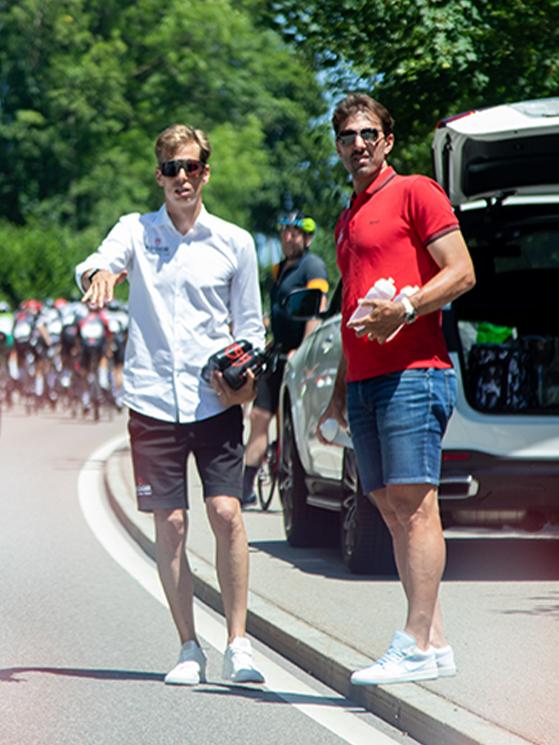 Raphael Meyer and Fabian Cancellara, Tudor Pro Cycling (credit: Tyler Haab)
Raphael Meyer and Fabian Cancellara, Tudor Pro Cycling (credit: Tyler Haab)
Reflecting on his team’s debut Tour de France, which has seen Tudor play the role of spirited attackers, albeit – with the exception of top threes on stages from Alaphilippe and Storer, while Trentin chipped in with a fifth – without much in the way of outright success.
“I think we’ve had a solid Tour so far,” he says. “Of course, we’re missing the victory that we came here for. But coming here as a first time-participating team and wanting to win a stage straightaway is a big ambition, much bigger than it sounds.
“But it’s not only on the sports side that we performed that makes me happy, but also on the staff side. I think everyone still has a smile on their face. Everyone is happy supporting each other, so that’s really nice.
“That’s part of the DNA of the team and the intention we’ve had from the beginning – to build a group of good people, and I mean genuinely good people.
“I’m not from cycling. I don’t know about this sport, but I try to learn every day. But if you know everything and your personality doesn’t fit the group, then it’s going to be difficult. And that’s why I said, first of all, people need to be good people and then the rest they can learn. Of course, with limitations, you cannot learn everything, but some things you can learn.”
And Meyer has been doing an awful lot of learning in recent years.
Building a team from scratch
Meyer, unlike many of his peers, doesn’t have a background in cycling. Instead, like any good Swiss stereotype, he originally went into banking, before eventually pursuing a Master’s degree in sports marketing. He then ended up working for the Tour de Suisse, his country’s national tour, bolstering his limited knowledge of the sport by religiously listening to the Cycling Podcast.
It was while working at the Tour of Switzerland that he first came into contact with Fabian Cancellara, the double Olympic champion, four-time world time trial champion, three-time Tour of Flanders and Paris-Roubaix winner, and national hero.
Cancellara, recently retired, was looking to give back to the sport. He enlisted Meyer to help him. They started running events, and even turned down an opportunity to take over the Tour de Suisse. Then, in late 2020, the Continental outfit Swiss Racing Academy looked set to fold. Spartacus, unwilling, as Meyer says, to see the “dreams of 16 young athletes destroyed”, wanted to step in.
“I was disarmed with all my rational arguments, so we started helping them,” he says.
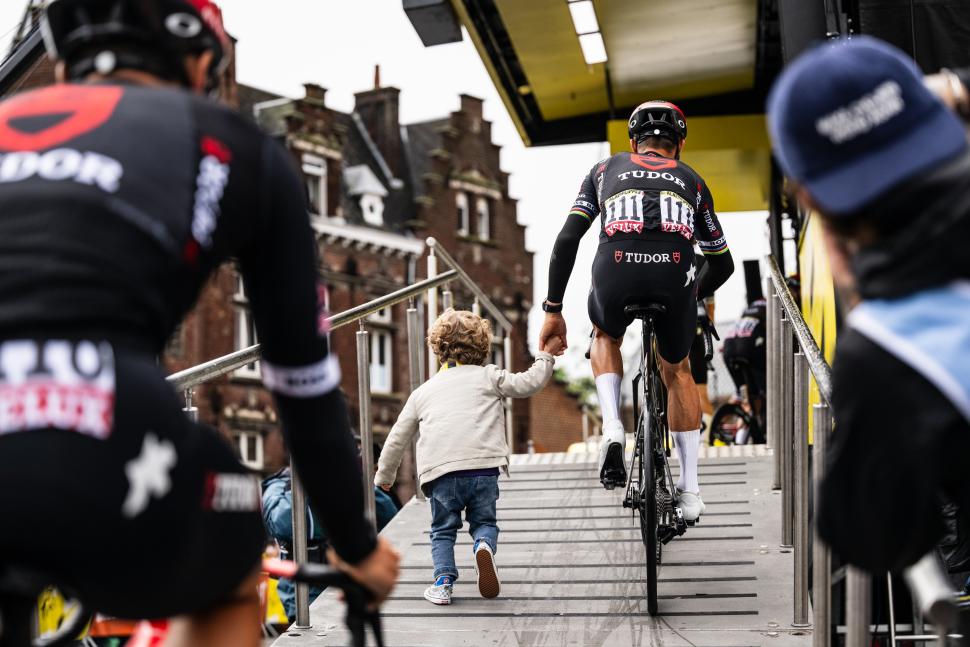 Julian Alaphilippe and Tudor Pro Cycling, 2025 Tour de France (credit: ASO/Charly Lopez)
Julian Alaphilippe and Tudor Pro Cycling, 2025 Tour de France (credit: ASO/Charly Lopez)
After taking over the third-tier team, the next goal became apparent: to create a proper Swiss professional team. Watchmaker Tudor, part of the same company as Rolex, were recruited as lead sponsor, and the squad’s ambitions rapidly accelerated.
“We realised at a certain moment that not all Swiss riders would get the chance to become professional,” Meyer notes. “If you’re French and trying to get on a French team, you’re pretty safe to make the cut.
“Whereas if you’re Swiss, you have to pretty good. Mauro Schmid [now at Jayco-AlUla], Stefan Bissegger [Decathlon-AG2R] were in the team, before our time, and became professional. But we realised quite soon that we need to have a Swiss professional structure.
“So we had this idea, and dream, and vision to have a professional team, without really knowing what a professional team means. What does it mean to have a UCI registered team?
“Of course, you need money and Fabian met people from Tudor, who were looking to get into cycling from quite some time, but couldn’t find the right project. So, we had a conversation from them, and that’s how it started.”
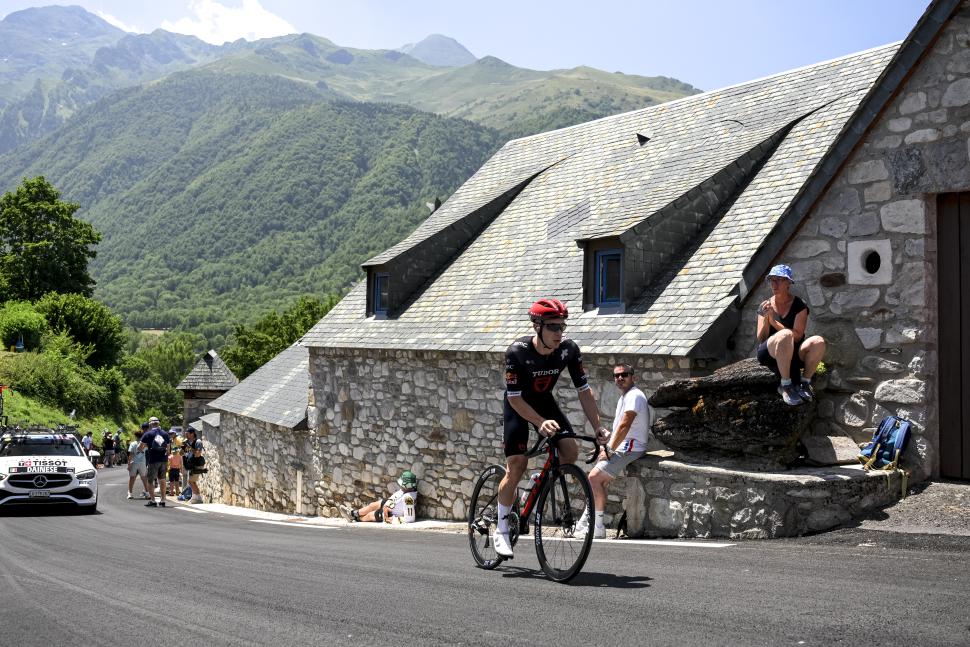 Alberto Dainese, stage 13, 2025 Tour de France (Charly) (credit: ASO/Charly Lopez)
Alberto Dainese, stage 13, 2025 Tour de France (Charly) (credit: ASO/Charly Lopez)
Tudor Pro Cycling soon established itself as one of the sport’s most ambitious young squads, the watch brand’s funds allowing Meyer and Cancellara to quickly establish a team that blended Swiss youth with international experience, a bit like the management duo themselves.
In 2023, Tudor’s first year as a second-tier ProTeam, they grabbed 11 victories, including Milano-Torino, courtesy of Arvid de Kleijn. De Kleijn then sprinted to the team’s first WorldTour victory the following spring at Paris-Nice, while Maikel Zijlaard won the prologue at the Tour de Romandie.
An invite soon followed to the Giro d’Italia, where the Australian Storer finished tenth on GC, a result he repeated again this year, after winning the Tour of the Alps.
Over the winter, Tudor bolstered their squad further with the arrival of big names such as two-time world champion Alaphilippe, Swiss classics contender Marc Hirschi, and experienced Austrian Marco Haller.
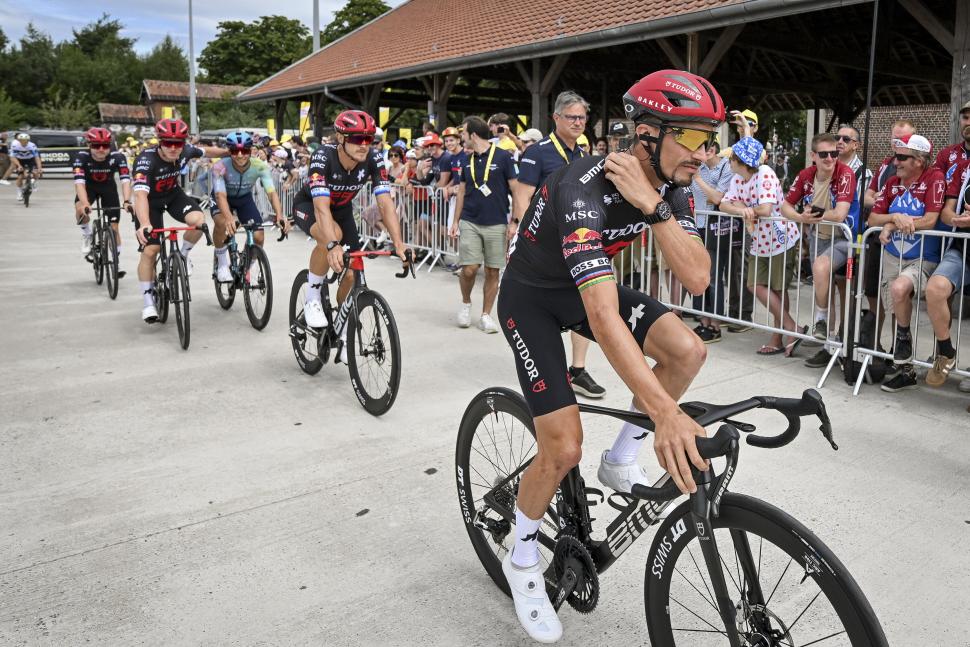 Julian Alaphilippe and Tudor Pro Cycling, 2025 Tour de France (credit: ASO/Charly Lopez)
Julian Alaphilippe and Tudor Pro Cycling, 2025 Tour de France (credit: ASO/Charly Lopez)
Earlier this year, Tudor’s presence at cycling’s holy grail, the Tour de France was confirmed. But, despite reaching the sport’s pinnacle just two and a half years into the team’s existence, Meyer is reluctant to talk about goals and ambitions, beyond, he says, securing long-term stability for his team.
“We had this challenge and opportunity at the same time with building from scratch, literally from scratch,” he says, getting more animated.
“So we said if we can build from scratch, we should build it based on, not a clear goal – because I always struggle with if people say we do this because we want to win the Tour de France.
“What do you do after winning the Tour de France? What do you do then? I don’t know. I’m not saying they’re wrong, but for us it was more about values. Our values are the foundation of everything we do.”
Swiss, Human, Performance
These values, Meyer says, are encapsulated in the team’s motto, ‘Swiss, Human, Performance’, which focuses on reliability, an understanding of how the squad’s staff and riders personally tick, and a concerted investment into research and design.
Part of that Swiss identity, Mayer notes, is about being reliable, to each other, to partners, to race organisers. But it’s also about supporting Swiss cycling in general and creating training hubs in the country itself, like their new alpine base in Andermatt.
“We wanted a destination as our mountain training home – Andermatt is near our HQ in Lucerne, it’s surrounded by mountain passes. Of course, because of the weather, we’ll always need to go to Teide or another warn destination in the winter. But in summer, it’s good, it’s safe.
“And we should capitalise on chances like this, because like other teams we’re proud of our nationality. Fabian said we wanted Swiss number plates on our cars from day one, which complicates life. But it also gives advantages.
“We want to create opportunities for Swiss youngsters, promote cycling in Switzerland, and address the challenges we have, like safety and traffic on the roads.”
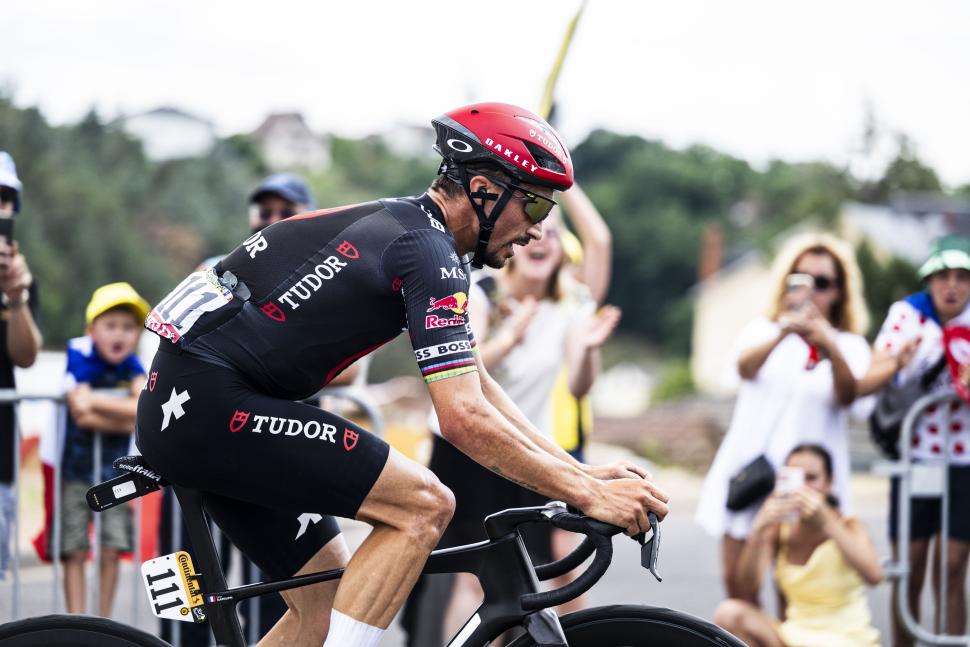 Julian Alaphilippe, stage 10, 2025 Tour de France (credit: ASO/Charly Lopez)
Julian Alaphilippe, stage 10, 2025 Tour de France (credit: ASO/Charly Lopez)
On the ‘human’ aspect of that motto, Meyer says the team attempts to balance the personalities of their riders and staff with the need to succeed on the road, and admits he’s turned down mooted signings because of the potential for internal conflict.
“We probably missed out on some riders, because we wouldn’t sell them full freedom within the team,” he says.
“On the sports side, if we feel that the human being is not in his top shape emotionally or mentally, it doesn’t make sense that he does five hours of training. Do two hours, and go for a walk afterwards. And I think that often in professional sports, and I’m not even narrowing it down to cycling, we are not open to talk about our feelings or our emotions. But I feel this is something that ee want to.
“Look at this world. There are wars, economic crises, people worried they won’t have jobs, people are afraid. But when people are standing on the side of the road at the bike race, everyone is laughing. Everyone has a smile and we are ultimately the ones allowing them to be happy.”
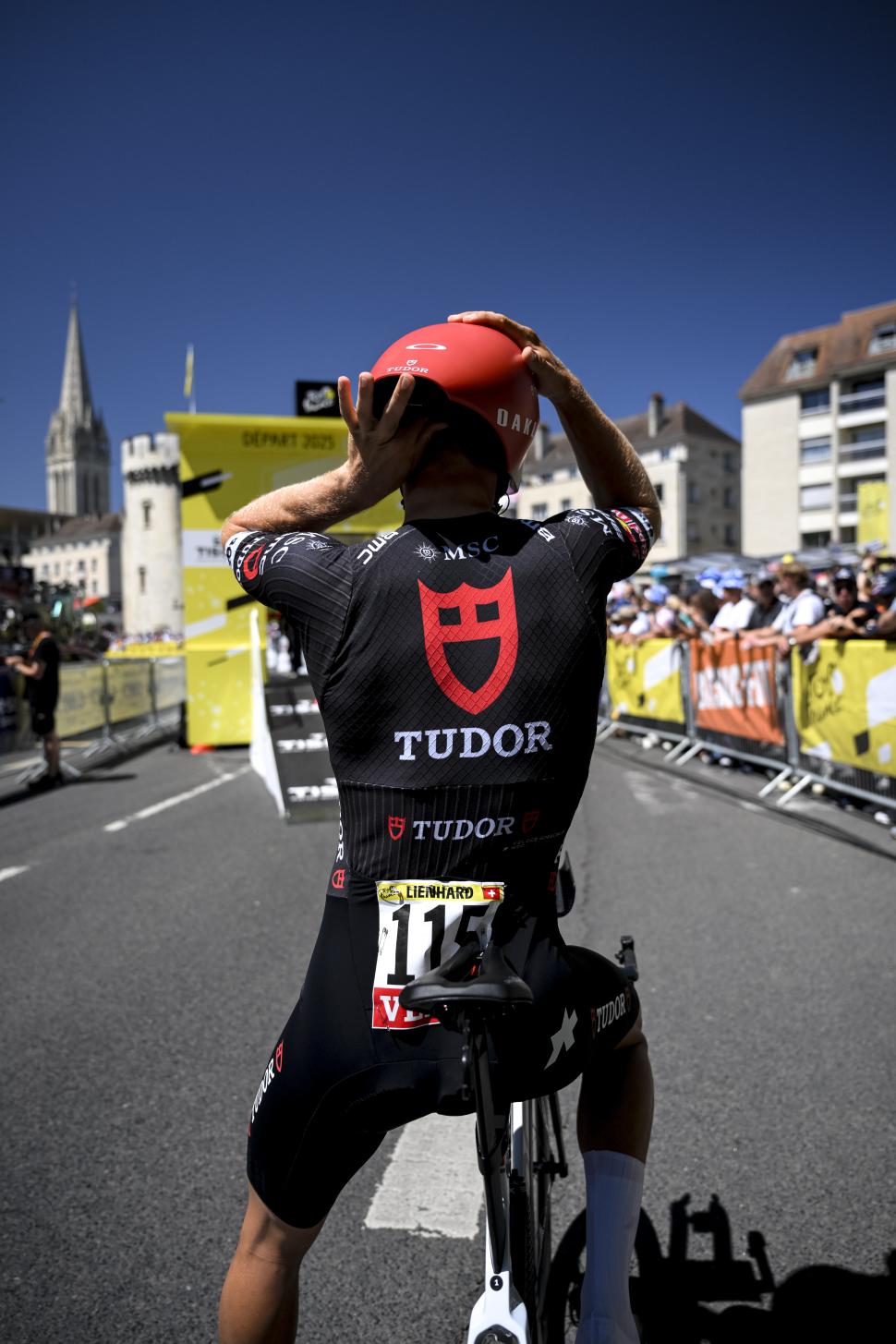 Fabian Lienhard, stage 5, 2025 Tour de France (Charly) (credit: ASO/Charly Lopez)
Fabian Lienhard, stage 5, 2025 Tour de France (Charly) (credit: ASO/Charly Lopez)
However, that doesn’t mean Tudor don’t want to be on the cutting edge when it comes to performance, either.
“We knew that ultimately R&D innovation is key to our sport. That’s why from the start we invested a lot in this, and why we keep investing a lot. We have five engineers working with us and we want to grow this team. Because we believe that with every euro we invest, we can make 30 guys better.
“If I pay a rider €1,000 more, he won’t even feel it, depending on which rider it is. But if I invest €1,000 to have a slush machine in the bus, for example, eight riders can get slush and cool down in the morning before the race, then eight benefit.”
“We had to buy roof racks, we had buy cool boxes, we had to buy everything”
The core values the team adheres to means Meyer is not drawn when it comes to vocalising goals and time frames to achieve them. For instance, Tudor’s 2025 debut was not a burning ambition, he insists.
“The value of a company is people,” he continues. “That’s why we have an indefinite timeframe ahead of us. We’re too often thinking in short-term one or two-year contracts.
“And of course, we have agents and partners and yearly budgets, of course, but I’m planning this team as if it were indefinite. We’re creating something for the long term. I want this team to exist in 40 years’ time. That must be the goal.”
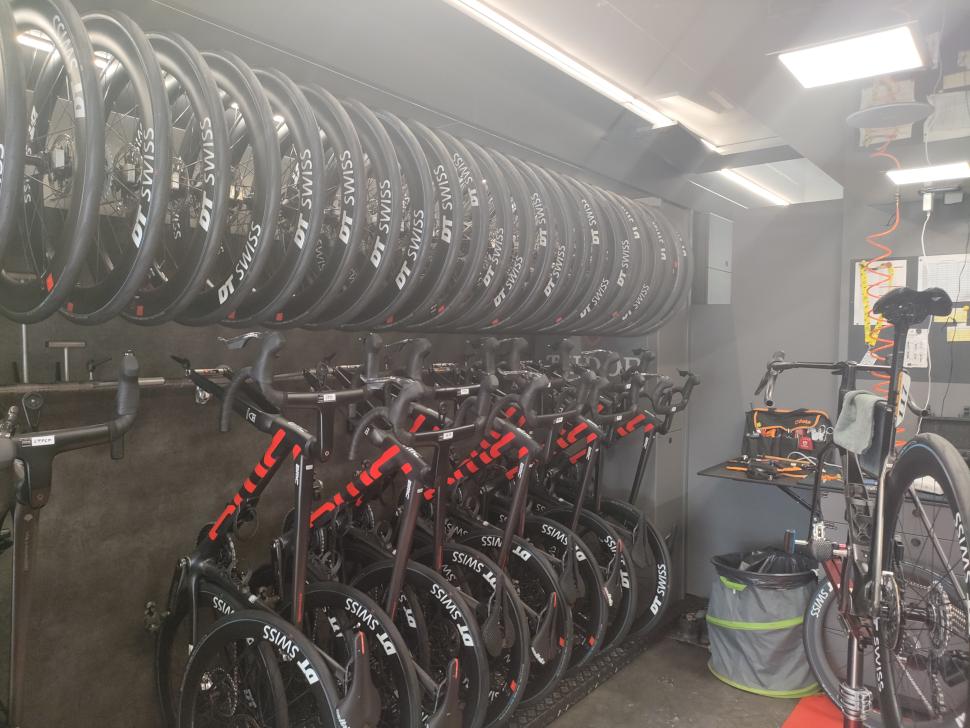 Tudor Pro Cycling rest day hotel, Montpellier, 2025 Tour de France (credit: Ryan Mallon)
Tudor Pro Cycling rest day hotel, Montpellier, 2025 Tour de France (credit: Ryan Mallon)
Nevertheless, two-and-a-half years is an extremely short time frame to build a squad capable of competing at the Tour de France. What challenges has Meyer and his team faced during this whirlwind period?
“We have trucks, we have cars, we have buses, we needed to buy these things,” he points out.
“And that was that was difficult, because there are teams that have been running for ten, 15, 20 years, they have service courses full of material and it’s just there. For us, it was not there. We had to buy roof racks, we had buy cool boxes, we had to buy every single item. And now we are here where we can compete in two, three grand tours a year.
“But people think it’s like this,” he says, clicking his fingers. “But it’s not. And we’re still building it, but it’s challenging. You want a bus, but the bus is more expensive than I thought, but I need a bus, so you need to make the budget work. And all these little things have made the last two-and-a-half years a huge ride.
“We’re probably one year in advance. Of course, you always have this idea, and the original plan was quite ambitious. But the way we’re doing it, with the values we have, the riders we have, with Fabian being a legend of our sport.
“Everything needs time. If the puzzle isn’t coming together now, that doesn’t mean it won’t come together in a year or two years’ time.
“And what do organisers want? They want big names, of course, but they also want good racing. And we’re always trying to make the race. We’ve seen this in the Tour, we’re always making it in the moves, we’re always there.”
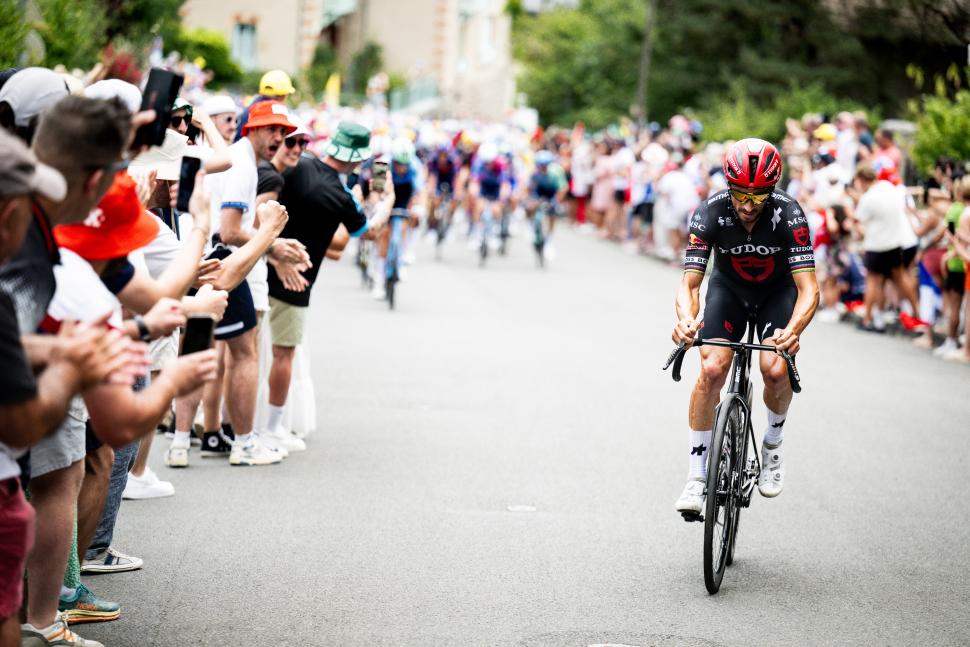 Julian Alaphilippe, stage 10, 2025 Tour de France (credit: ASO/Billy Ceusters)
Julian Alaphilippe, stage 10, 2025 Tour de France (credit: ASO/Billy Ceusters)
Those big names, of course, include Alaphilippe, who joined during the winter after a decade with Soudal Quick-Step, while Hirschi made the leap from UAE Team Emirates.
“No-one hides that they bring massive experience,” Meyer says of his new ambitious signings. “But first, before they are massively experienced, solid riders, they are also pretty classy humans, all of them. And that’s the base. They fit the group.
“My first ever conversation last year with Julian was 45 minutes long. 42 of those minutes were about family and kids. Three minutes were about sports.
“I said, ‘don’t worry Julian, you know Ricardo [Scheidecker, Head of Sport] from Quick-Step, you know our head coach. You’re going to be fine, you’re going to have your programme and preparation, that’s not a problem’.
“And the conversation was genuinely about family, what makes you happy. We’re in a special world, we’re travelling a lot, we’re away from home and our families, we’re missing some parts of our kids growing up, to be part of the team and make the team better. That’s why the humans need to be the right ones.
“And of course on the road, the experience of Matteo, LouLou, and Marc, it’s super valuable. And that’s help us to be recognised as a team. In the first year, people said, ‘but you’re a ProTeam’. But I haven’t heard that in a year.
“People don’t see us as a ProTeam, it’s just a logo on the jersey. We have the ambition to be a WorldTour team, and we function as one. Ask the riders – they don’t think they’re in a minor team.”
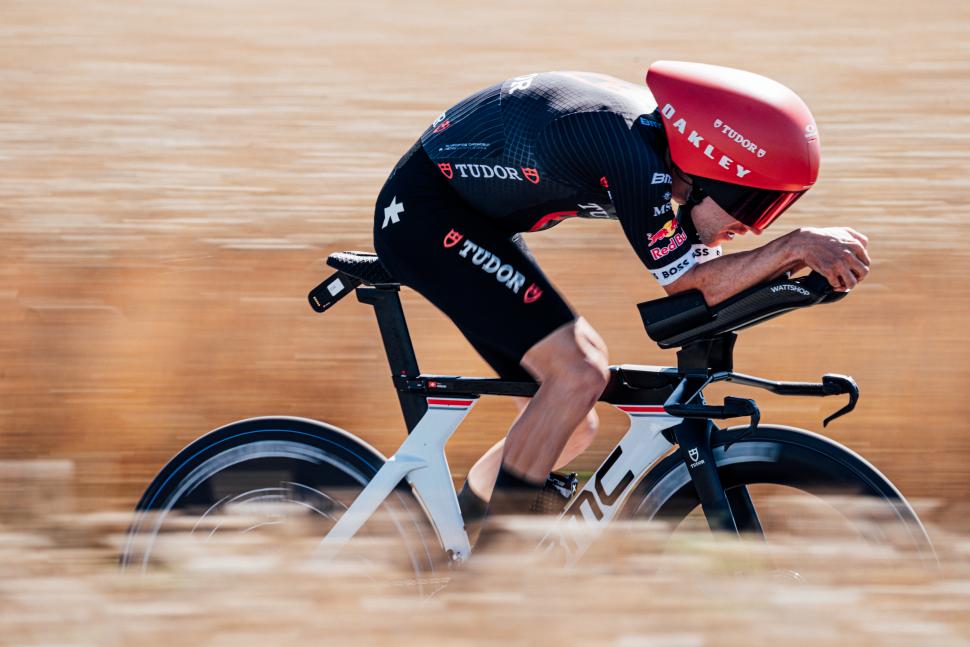 Marc Hirschi, stage five, 2025 Tour de France (credit: Zac Williams/SWpix.com)
Marc Hirschi, stage five, 2025 Tour de France (credit: Zac Williams/SWpix.com)
He continues: “It’s about the DNA and vision of the team. Right now, we’re in the position of the underdog. So we need to do things differently and properly, first to catch up with the big teams, and then ultimately be better than them.”
“Some of the riders here get what they missed in other teams. Because we’re built on a nice balance of inexperience – me – and experience from other teams, and values. And Fabian!
“And it’s this mix that allows us to try to create an environment where we’re a new team, we’re still a start-up, we’re still close to each other. But we also know there’s no compromise in training, no compromise in nutrition, no compromise in altitude camps. You could be the funniest bloke in the world, but if you don’t do altitude camps…”
“Here to stay”
But Meyer recognises the need to balance that racing “DNA” with acquiring enough UCI points to rise up the ranks and gain automatic invites to the sport’s biggest races, which can be achieved by finishing in the top three of the ProTeam rankings.
The next goal, though Meyer is again reluctant to put a time frame on it, is ultimate promotion to the WorldTour.
But for now, the prospect of a guaranteed racing calendar, Meyer points out, provides stability, for both the squad’s budget – which was stretched due to the pressures of chasing UCI points around Europe and beyond – and their riders’ racing programmes.
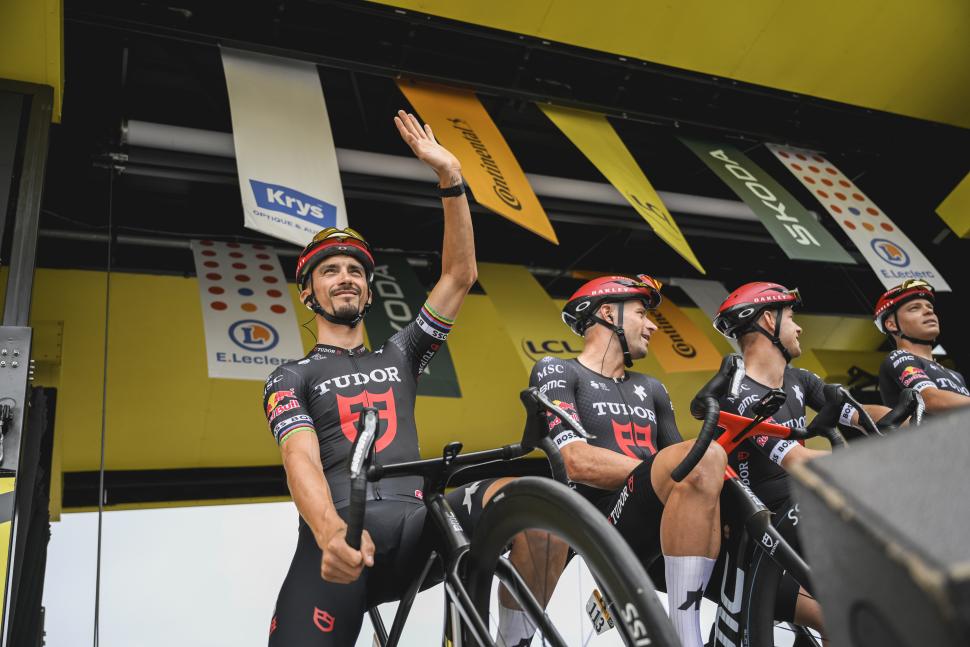 Julian Alaphilippe and Tudor Pro Cycling, stage one, 2025 Tour de France (credit: ASO/Charly Lopez)
Julian Alaphilippe and Tudor Pro Cycling, stage one, 2025 Tour de France (credit: ASO/Charly Lopez)
“Our sports management was under a lot of pressure to put the right guys in three different programmes, because we didn’t know which one will be confirmed,” he notes.
“We only found out in March that we were going to be doing the Tour, which put a lot of stress on both the staff and the riders. So, the guaranteed calendar will not only provide us access to the big races, but it also gives us the safety to plan the season.”
And what does reaching the Tour de France, and so quickly, mean for Meyer and his team?
“I’d never been to the Tour before,” he says. “I was once with Fabian in Paris on the Champs-Élysées watching the riders pass. But this is my first time – and now I know why everyone says the Tour de France is the biggest sports event in the world.
“And of course, we wanted to get the Tour. But if it wasn’t this year, it would have been next year. If it had been last year, then it would have been last year. It’s not the date that makes it.
“We know we are in the highest level of this sport, the best riders are here. That’s why winning a stage is a massive goal – already being here, people say, is massive. That was always the goal.”
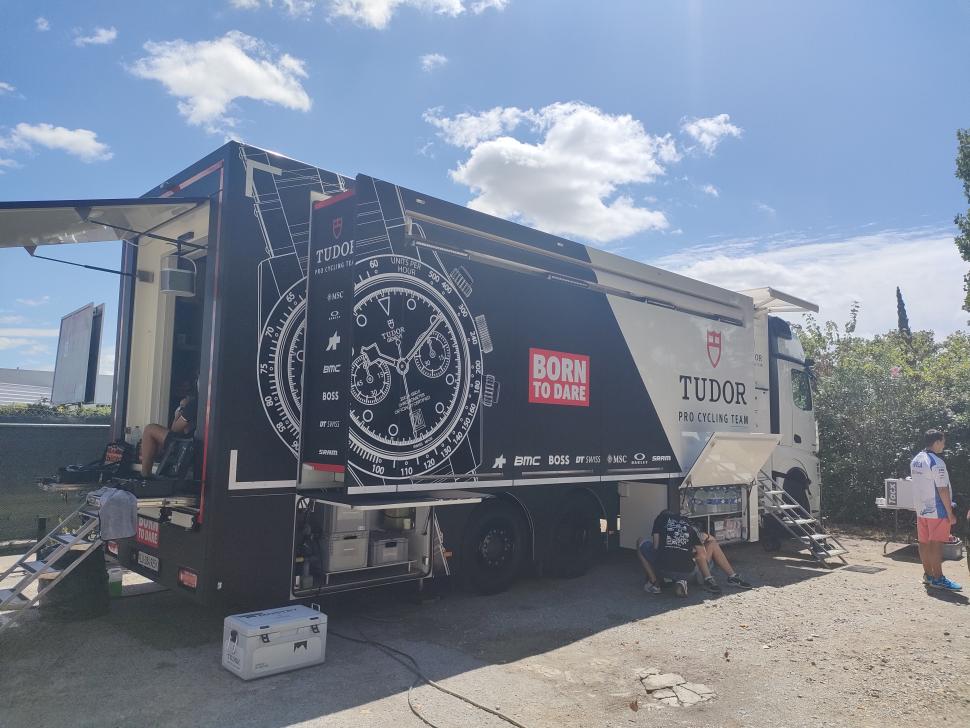 Tudor Pro Cycling rest day hotel, Montpellier, 2025 Tour de France (credit: Ryan Mallon)
Tudor Pro Cycling rest day hotel, Montpellier, 2025 Tour de France (credit: Ryan Mallon)
But racing at the sport’s highest level naturally brings its own challenges, especially for a relatively new team on the block. Not that Meyer was overly worried.
“Practically, due to the timing, there were things to change, to buy, to organise. But these are small things you can do within a day. We’re here to work, eh? This is our day job. Riders are prepared by the coaching group – but the Tour is not that different to the Giro, or any other race.
“It’s a bit bigger, it’s more logistics, but we have good people. Like Matteo Tosatto, our head sports director, he’s done so many grand tours as a rider and sports director. And that’s always been part of our strategy from the beginning, to bring people in with this experience, so we’re not struggling in the days before the Tour de France, not knowing what to do.”
Perhaps surprisingly, the aspect of Tour planning Meyer deemed the most important practically was, in fact, ice.
Forced to choose between expensive supermarket ice or the kind that was previously used to keep fish cold during deliveries, Tudor purchased their own freezer van, which Meyer says helps ease the work of the team’s soigneurs when it comes to keep the team cool in the baking heat of France in July, while also storing the riders’ food.
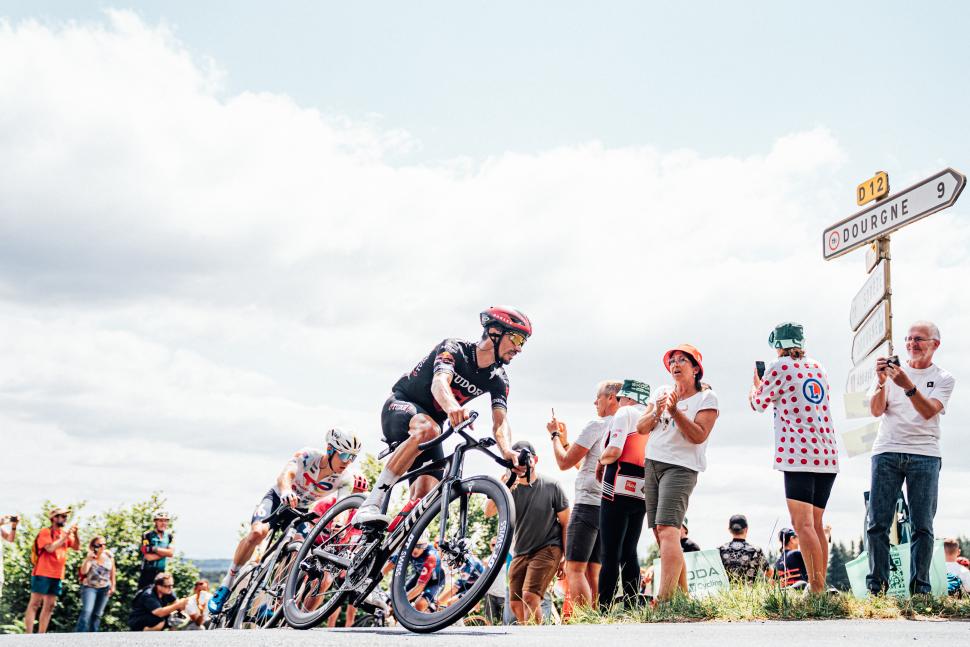 Julian Alaphilippe, stage 15, 2025 Tour de France (credit: Zac Williams/SWpix.com)
Julian Alaphilippe, stage 15, 2025 Tour de France (credit: Zac Williams/SWpix.com)
Nevertheless, despite the team’s exhaustive pre-Tour planning, he admits that mistakes have still been made over the course of the last three weeks in France.
“If I have a day where I make fewer mistakes than good things, that’s good,” the 39-year-old says. “But we can’t afford to do the same mistake twice.
“For instance, on the Tourmalet, we had nobody at the top with rain jackets. It was a mistake, we didn’t plan it, no-one thought about it. We had performance meetings before the Tour, during the Tour, the night before the stage, and no-one thought about it. And we were the only team up there without jackets and Michael [Storer] and LouLou were freezing going downhill.
“It’s a mistake. If someone says they’ve never made a mistake in their life, I’d like to get to know that person. It’s also human that we make mistakes, we can’t do everything right all the time. And if you just try to avoid doing something wrong, you don’t do it right.”
So, with his team just three-years-old and a Tour de France already under their belt, what does Meyer see as the next step for Tudor Pro Cycling? He leans forward in his chair once again.
“I’m not romantic in this, I know we need funding, we need money, we need sponsors, we need people
“And how can I get this money? I can get it from sponsors. That’s a big topic the team is thinking about every day, every week – how can we make this more stable? How can we create new revenue sources?
“Then, I think future is bright for us and we are here to stay – whatever it means to be here to stay.”
The road.cc Podcast is available on Apple Podcasts, Spotify, and Amazon Music, and if you have an Alexa you can just tell it to play the road.cc Podcast. It’s also embedded further up the page, so you can just press play.

